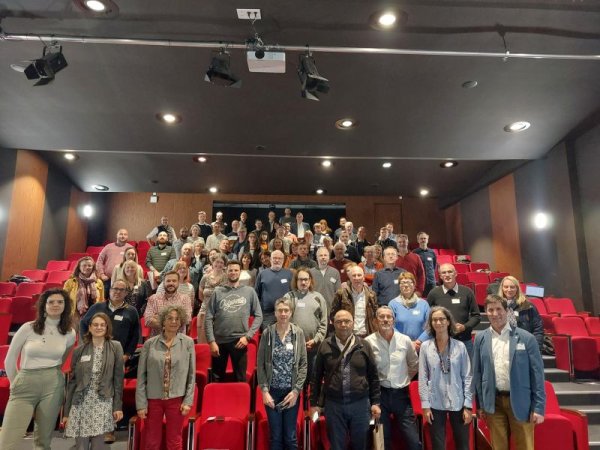
The BELIS project started on 1st October 2023, with a consortium of 34 partners, including research and technical institutes, plant breeders and seed companies as well as other relevant actors in legume breeding from 18 countries (15 EU countries, Switzerland, United Kingdom, and Lebanon).
On 17th and 18th October 2023, the consortium partners gathered at the project’s kick-off meeting that marked the official launch of this multi-actor project. The event, organised by INRAE as project coordinator, was held in person and took place in Ancenis, France, at Cérience/Terrena headquarters. Chief researcher Dr Rita Armonienė from Laboratory of Genetics and Physiology and senior researcher Dr Eglė Norkevičienė from Department of Grass Breeding were participating in this meeting as project partners from LAMMC. For two days, partners shared the BELIS objectives and methodologies with the aim to establish the first steps of the project. The meeting included a visit to the Terrena seed factory in Beaufort-en-Vallée.
Sustainability and competitiveness challenges in legume breeding
Legumes are widely acknowledged to provide multiple benefits in farming and food systems. They are a source of proteins and other nutrients for human and animal consumption, and when included in cropping systems, they can fix atmospheric nitrogen, besides other advantages linked to crop rotations. However, their presence in European cropping systems has not reached its potential, and Europe is still highly dependent on plant protein imports. One of the reasons is the lack of sufficient legume varieties that can provide stable and abundant yields adapted to different agroclimatic situations and stresses, with quality traits suitable for food and feed.
Less-than-optimal breeding efforts have so far been invested by public and private breeders. However, with adequate breeding inputs, the genetic benefits of legume crops can reach those of major crops. While legume breeding is mostly based on traditional phenotypic recurrent selection that requires updating, the use of molecular information and exploitation of genetic resources could also increase selection intensity and speed.
In addition, the genetic progress achieved in new varieties could be delivered much more efficiently to the legume value chain actors (farmers, food, and feed industry) and the specific requirements of down-stream actors could be better considered in breeding. The first step of genetic progress delivery relies on the variety registration process, ruled at an international level but conducted by national registration offices. The current registration process needs to be improved by focusing more on the needs of stakeholders. The second step is to provide adequate information on the available varieties. Extension services could effectively provide information to all participants in the legume value chain, and the seed industry is important in providing of genetic progress to farmers by granting access to improved seeds. Improved governance and business models should be also developed to bring more efficient, profitable, and diverse legume varieties to farmers.

BELIS objectives
The BELIS project will address these challenges and provide tools and solutions that will increase the economic sustainability of legume-based farming systems. This ultimate goal will be achieved through three specific objectives:
The project will focus on seven forage crops: red, white, and annual clovers, lucerne, sainfoin, birdsfoot trefoil, and vetches, and seven grain crops: pea, faba bean, soybean, white lupin, lentil, chickpea, and common bean, representing the diversity of legume species cultivated in Europe.
BELIS will provide scientific advances and technical innovations on key aspects of the breeding process: genotyping and phenotyping methods and tools, proposals for agronomic and technological characterisation of varieties, cross testing in different conditions, and pathways for improving and homogenising registration processes. All these results will be streamed to design and validate new governance and business models for the legume breeding industry. An ambitious networking, dissemination, capacity building and exploitation plan will help BELIS results and recommendations reach the breeding industry, the farmers, and the regulatory bodies.
BELIS will contribute to a more competitive legume breeding industry in Europe and supply profitable and adapted genetic varieties to European farmers looking for better legume seeds.
The role of LAMMC in BELIS:
Contributing tasks:
Plant species: Pisum sativum and Lotus corniculatus.
Project participants at LAMMC:
Chief researcher Dr Rita Armonienė,
Senior researcher Dr Eglė Norkevičienė,
Senior researcher Dr Algė Leistrumaitė,
Senior researcher Dr Andrius Aleliūnas,
Researcher Dr Giedrius Petrauskas,
Junior researcher Kristyna Razbadauskienė.
For more information, please contact:
Coordinator at LAMMC Dr Rita Armonienė rita.armoniene@lammc.lt
Visit BELIS project website: http://www.belisproject.eu/
The BELIS project has received funding from the Horizon Europe research and innovation programme under the Grant Agreement No. 101081878.
